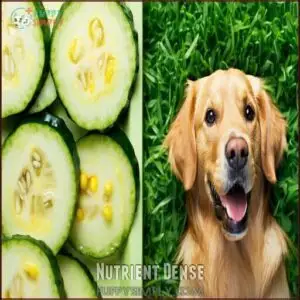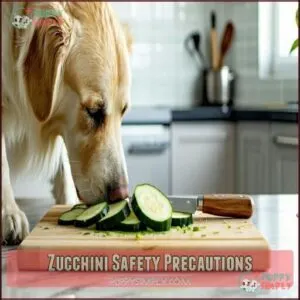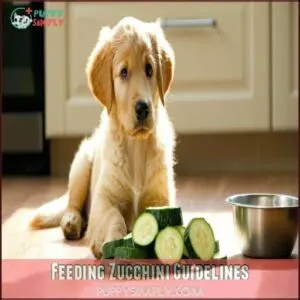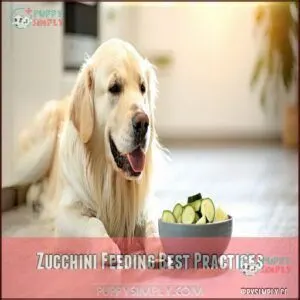This site is supported by our readers. We may earn a commission, at no cost to you, if you purchase through links.

Zucchini can support digestion, help with weight management, and even add some crunch as an occasional treat. Just remember to serve it plain—skip the seasoning, oil, or spices.
Chop it into bite-sized pieces to avoid choking, and start with small amounts to see how your dog’s tummy reacts. Avoid feeding zucchini that’s bitter, as this could upset their stomach.
Curious about how to prepare it or the best portions? There’s more to explore, especially regarding healthy and low-calorie options, and how zucchini can aid in weight management.
Table Of Contents
- Key Takeaways
- Zucchini Nutrition Benefits
- Can Dogs Eat Zucchini
- Zucchini Safety Precautions
- Feeding Zucchini Guidelines
- Zucchini Health Benefits
- Zucchini Risks and Considerations
- Zucchini Feeding Best Practices
- Frequently Asked Questions (FAQs)
- Can dogs eat zucchini with skin?
- How much zucchini can I give my dog?
- Is raw zucchini safe for dogs to eat?
- What are the best vegetables for dogs?
- Can puppies eat zucchini?
- Is raw zucchini better than cooked?
- How much zucchini is too much?
- What if my dog has allergies?
- Can I mix zucchini with other foods?
- Can zucchini help with hydration in dogs?
- Conclusion
Key Takeaways
- Dogs can eat zucchini, and it’s a low-calorie, nutrient-packed treat that supports digestion, hydration, and weight management.
- Always feed plain zucchini, either raw or cooked, in small, bite-sized portions to avoid choking or digestive upset.
- Avoid bitter zucchini and seasonings like garlic or onion, as these can be harmful to your dog.
- Introduce zucchini gradually, monitor for allergic reactions, and consult your vet to make sure it fits your dog’s diet.
Zucchini Nutrition Benefits
Zucchini is packed with essential nutrients like vitamins, minerals, and antioxidants that can support your dog’s overall health.
Its low calorie and high fiber content make it a great option for weight management and digestion.
Rich in Antioxidants
Zucchini is packed with antioxidants for dogs, especially carotenoids.
Packed with carotenoids, zucchini delivers powerful antioxidants that naturally boost your dog’s immunity and overall cellular health.
These antioxidants fight free radicals, protecting your pup’s cells from oxidative stress.
Here’s how they boost health:
- Support skin and coat health.
- Reduce inflammation naturally.
- Aid cellular protection against aging.
- Enhance overall immunity.
Integrating zucchini into your pet’s diet offers essential dog nutrition and antioxidant benefits, promoting long-term health.
For enhanced benefits, consider high ORAC values in their diet.
Aids in Digestion
Good digestion matters for your dog’s overall health.
Packed with fiber, zucchini supports a thriving gut microbiome, aids constipation relief, and even helps with diarrhea management.
Its high water content works alongside natural digestive enzymes to soothe your dog’s stomach.
Feeding zucchini for dogs in measured portions can improve dog digestion while promoting better overall digestive health.
Nutrient Dense
Packed with a vitamin variety and mineral power, zucchini for dogs offers impressive health perks.
It’s nutrient-dense, delivering a rich antioxidant boost, fiber benefits, and acting as a hydration source.
This low-calorie powerhouse enhances your dog’s diet by providing key vitamins like A, C, and K, along with potassium and magnesium.
A true gem in the dog nutrition guide!
Supports Weight Loss
A cup of zucchini offers only 17 calories, making it a star for calorie restriction in dog weight management.
Its high fiber benefits promote satiety, reducing your dog’s urge to overeat.
Plus, the hydration effects from zucchini’s water content keep them feeling refreshed, and portion control is key, though—too much can upset their tummy, so feed zucchini for dogs in moderation.
Can Dogs Eat Zucchini
Yes, dogs can eat zucchini, and it’s a great addition if prepared safely.
As a low-calorie, nutrient-packed veggie, zucchini is safe for dogs when served plain and in moderation. It’s a fantastic option for homemade treats, grain-free diets, or even vegan diets.
Dogs benefit from its fiber, vitamins, and hydration, but overfeeding can lead to digestive upset.
Always chop zucchini into bite-sized pieces to avoid choking hazards and verify that raw or cooked zucchini is plain—no garlic, onion, or seasoning. Some dogs may turn up their noses at this veggie’s taste, so try mixing small amounts with regular food.
Zucchini is also beneficial for dogs with kidney disease because of its low phosphorus content. Consult your vet for personalized dog nutrition tips.
Zucchini Safety Precautions
When feeding zucchini to your dog, you need to take a few key precautions to keep them safe.
Choosing fresh zucchini, preparing it properly, and watching for any signs of discomfort can help prevent potential issues.
Choosing The Right Zucchini
When choosing zucchini for your dog, opt for fresh, ripened zucchini with smooth skin coloration—avoid any with discoloration or blemishes.
Organic vs. non-organic matters too, as organic reduces pesticide exposure.
Size matters; smaller zucchini have fewer cucurbitacins, reducing the risk of bitterness and toxicity.
Check freshness indicators like firmness and avoid overly soft or shriveled options.
Select safe varieties carefully.
Removing Seeds and Skin
To keep zucchini safe for dogs, always focus on proper preparation. Remove seeds to reduce choking hazards and aid digestion.
While the skin is safe and adds fiber, scrub thoroughly to eliminate pesticides. Cutting zucchini into bite-sized pieces improves skin digestibility and prevents choking.
Zucchini offers nutritional benefits, as it’s rich in Vitamin C. Prioritize simple, thoughtful preparation to maximize the benefits of zucchini for dogs without risking nutrient loss.
Avoiding Bitter Zucchini
After removing seeds and skin, it’s important to avoid bitter zucchini.
Bitter compounds like cucurbitacins can harm dogs, leading to nausea, cramps, or diarrhea.
Smaller zucchinis or organic zucchini are safer choices.
Always perform a quick taste test to detect bitterness.
Discard any bitter vegetables immediately.
You can also find prepared zucchini treats online.
This small step guarantees your dog enjoys zucchini without the risks of toxic vegetables.
Preventing Choking Hazards
After bitterness, focus sharpens on choking prevention. Dogs, especially smaller ones, need zucchini served in bite-sized chunks—size matters.
Use proper slicing and consider slow feeders to encourage safe eating. Supervise eating, as gulping whole pieces can be risky.
For picky eaters or those prone to choking hazards, puree options make zucchini easier to swallow while offering all its nutritional benefits.
Feeding Zucchini Guidelines
When feeding zucchini to your dog, it’s important to start slowly and offer small portions to avoid upsetting their stomach.
Always monitor for any signs of discomfort and consult your veterinarian to confirm it’s a suitable addition to their diet.
Treat Portion Control
In the case of zucchini dog treats, sticking to proper portion sizes keeps things safe and healthy.
A teaspoon or tablespoon, depending on your dog’s size, works great for occasional snacks.
Calorie counting and treat frequency matter for a balanced diet.
Using zucchini supports weight management without overloading their system—always mix as part of daily nutrition goals to ensure proper portion sizes.
Introducing Zucchini Gradually
When adding zucchini to your dog’s diet, start small and use a gradual introduction. Dogs need time to adjust, so observe reactions like changes in energy or stool.
Start small with zucchini, watch for changes, and let your dog adjust naturally to this healthy, nutrient-packed treat.
Try these steps:
- Offer small, plain zucchini pieces as a snack.
- Mix shredded zucchini into regular dog food.
- Gradually increase portions after ensuring positive reactions.
This helps support digestion and avoids discomfort, making it a safe way to introduce zucchini as a healthy addition to your dog’s diet.
Monitoring for Digestive Issues
Keep an eye on your dog’s stool consistency, appetite changes, and signs of vomiting or gas production when introducing zucchini.
Fiber overload can upset dog digestive health, leading to gastrointestinal problems. If your pup shows any digestive issues, like unusual stools or decreased appetite, pause feeding.
You might also want to look at dog digestive supplements.
Monitoring dog zucchini digestion guarantees better dog gastrointestinal health without risking discomfort, and it is crucial for maintaining your dog’s overall digestive health and preventing discomfort.
Consulting With a Veterinarian
A veterinarian consultation is key before introducing zucchini into your dog’s diet, especially for dietary changes.
Dogs, like humans, vary in reactions.
Here are tips:
- Check for zucchini allergies common in certain breeds.
- Consult on safe portions for puppies or senior dogs.
- Discuss breed predispositions for kidney issues.
- Get personalized dog zucchini veterinarian advice for health needs.
The importance of a veterinarian consultation cannot be overstated, as it ensures the introduction of zucchini is done safely and with consideration of the dog’s specific health needs.
Zucchini Health Benefits
Zucchini offers several health benefits for your dog, thanks to its rich nutrient content and low-calorie profile.
It supports digestion, weight management, and overall wellness with essential vitamins, minerals, and antioxidants.
Boosting Digestion
Zucchini can work wonders for your dog’s digestion.
Its fiber benefits—including both soluble and insoluble fiber—support a balanced gut microbiome. This helps relieve constipation and prevent diarrhea.
Plus, zucchini’s prebiotics promote healthy bacteria in your dog’s digestive system.
Just make certain of portion control so your furry friend gets the dog zucchini benefits without overloading their tummy. Fiber makes everything smoother!
Supporting Weight Management
Zucchini is a fantastic low-calorie treat for managing your dog’s weight.
Its high fiber promotes fullness, making calorie restriction easier without leaving your pup starving. Swap high-calorie treats with zucchini for better portion control.
Pairing these treat alternatives with exercise integration enhances weight loss. It’s a simple way to support your dog’s diet and maintain a healthy weight.
Providing Essential Vitamins and Minerals
Zucchini packs a punch in the area of dog vitamins and minerals.
It supports overall well-being by promoting vitamin absorption and mineral bioavailability.
Here’s what your pup gains from zucchini’s nutritional value:
- Vitamin C: Enhances immune support and coat quality.
- Potassium: Maintains muscle and cellular health.
- Magnesium: Boosts energy levels.
- Manganese: Aids in bone strength.
Zucchini Risks and Considerations
Feeding zucchini to your dog isn’t without risks, so it’s important to understand potential issues.
High fiber, oxalates, and certain toxins can lead to digestive upset, kidney problems, or allergic reactions if not managed properly, which highlights the need to be cautious with zucchini.
High Fiber Content
Zucchini’s high fiber content helps with satiety, gut microbiome, and constipation relief, improving your dog’s stool quality.
While fiber supports dog digestive health, too much can lead to fiber overload, causing dog digestive issues like gas or diarrhea.
Balance is key—moderate dog zucchini fiber intake guarantees effective benefits without discomfort, keeping your pup’s digestion on track and their diet well-rounded.
Oxalates and Kidney Stones
You’re considering zucchini for your dog, but oxalates pose a risk.
As an oxalate source, zucchini may contribute to stone formation, especially in breeds with kidney disease predisposition.
Emphasizing dietary management and hydration importance to prevent kidney stones in dog health conditions is crucial, highlighting the need for careful hydration.
Pancreatitis Risk
Dogs with underlying conditions, like pancreatitis, need dietary caution.
While zucchini’s low fat content makes it suitable, its high water content might still pose risks.
Stick to small zucchini quantities and make certain it’s plain, not fried.
Breed predisposition can also influence dog health conditions.
Always consult your veterinarian about dog dietary restrictions before introducing zucchini to their meals, considering the potential dietary caution.
Allergic Reactions and Skin Irritation
Sometimes, zucchini may trigger allergic reactions or skin irritation in dogs, even though it’s a dogsafe food.
Watch for these signs:
- Itchy skin or redness
- Swelling or hives
- Excessive licking or scratching
- Upset stomach
- Breathing problems
If symptoms appear, consult a vet.
Identify allergens and consider alternative vegetables suited for dog sensitivities.
Breeds vary in reaction severity.
Don’t ignore signs.
Zucchini Feeding Best Practices
When feeding your dog zucchini, stick to plain, unseasoned options like raw, steamed, or cooked pieces.
Always avoid adding harmful ingredients like garlic, onion, or heavy seasonings to keep it safe and healthy.
Raw, Steamed, or Cooked Zucchini
Raw zucchini dogs enjoy may be harder to digest, while steaming benefits nutrient retention and boosts palatability factors.
Cooking methods like boiling or steaming improve its texture, making it easier to chew. In the case of zucchini preparation dogs prefer, raw digestibility varies by dog.
You might even find specialty zucchini treats available for purchase. Stick to plain preparation, ensuring the zucchini serving size aligns with your dog’s dietary needs, and consider the digestibility varies.
Avoiding Seasoned or Processed Zucchini
Steer clear of seasoned or processed zucchini when feeding your dog; toxic seasonings like garlic or onion can harm them.
Processed zucchini often contains hidden ingredients or additives that aren’t dogsafe foods. Stick to plain, fresh zucchini as a safe alternative.
Always read labels carefully and choose simple preparations to avoid dog harmful foods and prevent potential allergies.
Zucchini offers benefits like digestive health support, providing digestive health advantages.
Checking for Garlic and Onion Content
Watch out for toxic seasonings like garlic and onions when preparing zucchini for your dog.
These hidden ingredients can sneak into dressings or cooked recipes and cause garlic toxicity or onion toxicity.
Stick to safe alternatives by preparing zucchini plain, and practice preparation awareness and careful label reading to guarantee your dog avoids those toxic vegetables lurking in common foods.
Mixing With Regular Dog Food
You can mix zucchini into dog food by using it as a topper or blending it with their regular meal.
It’s a great way to boost nutritional balance and address palatability issues.
Cut zucchini into small, manageable pieces to avoid choking.
Pair it with commercial dog food to supplement meal size while watching for food allergies or sensitivities, and consider it a way to address palatability issues.
Frequently Asked Questions (FAQs)
Can dogs eat zucchini with skin?
Yes, dogs can eat zucchini with the skin, but make sure it’s washed to remove pesticides.
The skin packs extra nutrients and fiber, but feed small amounts to avoid upsetting your dog’s stomach.
How much zucchini can I give my dog?
You can give small dogs 1–2 teaspoons of zucchini daily, medium dogs 2–3 teaspoons, and large dogs 1–2 tablespoons. Keep treats like zucchini under 10% of their diet to balance nutrition.
Is raw zucchini safe for dogs to eat?
Raw zucchini is safe for dogs when fed in moderation.
It’s packed with nutrients, low in calories, and hydrating.
Cut it into small, plain pieces to avoid choking hazards, and always monitor for reactions.
What are the best vegetables for dogs?
In the case of veggie options, think carrots, green beans, broccoli, and sweet potatoes.
These pack nutrients like fiber and vitamins while being easy on digestion.
Always prep veggies plain and monitor for allergies.
Can puppies eat zucchini?
Puppies can eat zucchini, but start with small amounts and watch for digestive upset.
Stick to plain, bite-sized pieces, either steamed or raw.
Always consult your vet before adding new foods to your puppy’s diet.
Is raw zucchini better than cooked?
It depends on your dog’s needs.
Cooking zucchini makes it softer and easier to digest, while raw zucchini retains more nutrients.
Either works as long as it’s plain, chopped small, and fed in moderation.
How much zucchini is too much?
Too much zucchini can cause digestive upset, like diarrhea or vomiting.
Stick to the safe amounts—1-2 teaspoons for small dogs, 2-3 teaspoons for medium dogs, and 1-2 tablespoons for large dogs daily.
What if my dog has allergies?
If your dog has allergies, introduce zucchini slowly and watch for symptoms like itching or upset stomach.
Choose organic zucchini, serve it plain, and consult your vet to confirm it’s a safe addition to their diet.
Can I mix zucchini with other foods?
You can mix zucchini with other dog-safe foods like carrots, green beans, or cooked chicken.
Always keep portions small, avoid seasonings, and introduce new mixes gradually to prevent upsetting your dog’s stomach, this is crucial for your dog’s health, so introduce new mixes gradually.
Can zucchini help with hydration in dogs?
A drop in the bucket can still quench thirst.
Zucchini’s high water content helps hydrate your dog, especially during hot weather.
It’s a safe way to support hydration while offering essential nutrients.
Conclusion
Zucchini is safe for dogs and offers plenty of health benefits, such as aiding digestion and supporting weight management.
It’s low-calorie and packed with nutrients. Chop it into manageable pieces, serve it plain, and avoid bitter zucchini to keep your pup healthy.
Start with small amounts to monitor for any digestive issues. While zucchini can be a tasty snack, it’s important to feed it in moderation.
Always consult your vet if you’re unsure about adding new foods, as this ensures the health of your pet.
- https://www.ncbi.nlm.nih.gov/pubmed/24996338/
- https://fdc.nal.usda.gov/fdc-app.html
- https://www.houndsy.com/blogs/modern-tails/can-dogs-eat-zucchini-a-comprehensive-guide-for-pet-owners?srsltid=AfmBOoq-PxiZynaVdSKsBoP22DPo_AxBb_28aOQSURUsKR-ZjwRr7HmC
- https://www.kinship.com/dog-nutrition/can-dogs-eat-zucchini
- https://dogchild.co/blogs/learn/can-dogs-eat-zucchini-can-dogs-eat-courgette-can-dogs-eat-summer-squash?srsltid=AfmBOoqmk1tO9bQhbT0lkuciXgoW9xyEDXGprjaexU426eSyhEOs4qtX















